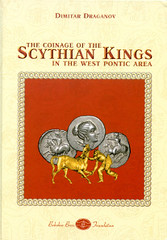
PREV ARTICLE
NEXT ARTICLE
FULL ISSUE
PREV FULL ISSUE
BOOK REVIEW: THE COINAGE OF THE SCYTHIAN KINGS
In the October 1, 2015 issue of CoinsWeekly, Ursula Kampmann published a review of Dimitar Draganov's book on the coinage of
the Scythian Kings -Editor
Generally speaking, the world of ancient numismatics is rather simple. It consists of two parts, the Greeks on the one hand, and the Romans on the other hand. Admittedly, the Celts and the Byzantines have managed to develop a life of their own, as it were, but all the other peoples which past generations, rather disrespectfully, used to call “Randvölker” (borderland peoples) almost never make it into the headlines. Yet they form such an essential element of the rich tapestry of the ancient world. Take the Skythians, for example, which have been the subject of romantic and glorifying descriptions as early as Herodotus. King Ateas, coeval with Philipp II of Macedonia, successfully gained control over almost all Skythian tribes. We do not know for sure how he achieved this diplomatic and military masterpiece. But one thing is certain. He most likely spent as much energy on his campaigns as Philipp II on his conquest of Greece, which, however, found a much greater response by the chroniclers. Furthermore, the Skythian coins continue to be subsumed under the title “Greek Coinage” in all catalogs. This has become a cherished habit, though it surely is historically inaccurate. Anyhow, the new monograph written by Dimitar Draganov focuses on this intriguing coinage. The first part deals with the coins minted under King Ateas during the first Skythian kingdom which Philipp II destroyed in 339. This part likewise includes the coinage of the city of Dionysopolis, the specimens of which depict an equestrian statue of the king. The second part examines the coinage of the second Skythian kingdom on the Dobruja, ruled by the members of a single dynasty between ca. 218 and 168/7 BC, including the following kings: Tanousas, Kanites, Akrosas, Charaspes, Aelis, and Sariakes. The author has done fundamental work here. The relative chronology of the rulers of the second Skythian kingdom used to be a matter of scholarly dispute; with this book, Dimitar Draganov not only presents a conclusive reconstruction of the line of succeeding rulers but also gives reliable dates. Dimitar Draganov studies the depictions of all types of coinage in detail, putting a special emphasis on the countermarks. To put it briefly, the reader is provided with an excellent and lavishly illustrated numismatic commentary. The author likewise benefits from his knowledge of both Western and Eastern languages. He submits a synthesis of the research on this subject-matter and has nevertheless decided to formulate his own findings not in his first language, Bulgarian, but in English instead. The international numismatic community will most likely appreciate this. This takes us to the die corpus that presents the material neatly arranged and fully illustrated with marvelous images, making the book a valuable standard reference. Every coin dealer, every museum curator will treasure it when he or she is preparing a catalog. What is more, Dimitar Draganov devotes an entire chapter to modern counterfeits. Anyone inclined to think that there was no such thing as a forged bronze coin will be taught better. To cut a long story short, this book is a new standard work and is a must-have for every library aiming at complying with scientific standards. To read the complete article, see:
Wayne Homren, Editor The Numismatic Bibliomania Society is a non-profit organization promoting numismatic literature. See our web site at coinbooks.org. To submit items for publication in The E-Sylum, write to the Editor at this address: whomren@gmail.com To subscribe go to: https://my.binhost.com/lists/listinfo/esylum All Rights Reserved. NBS Home Page Contact the NBS webmaster 
|
